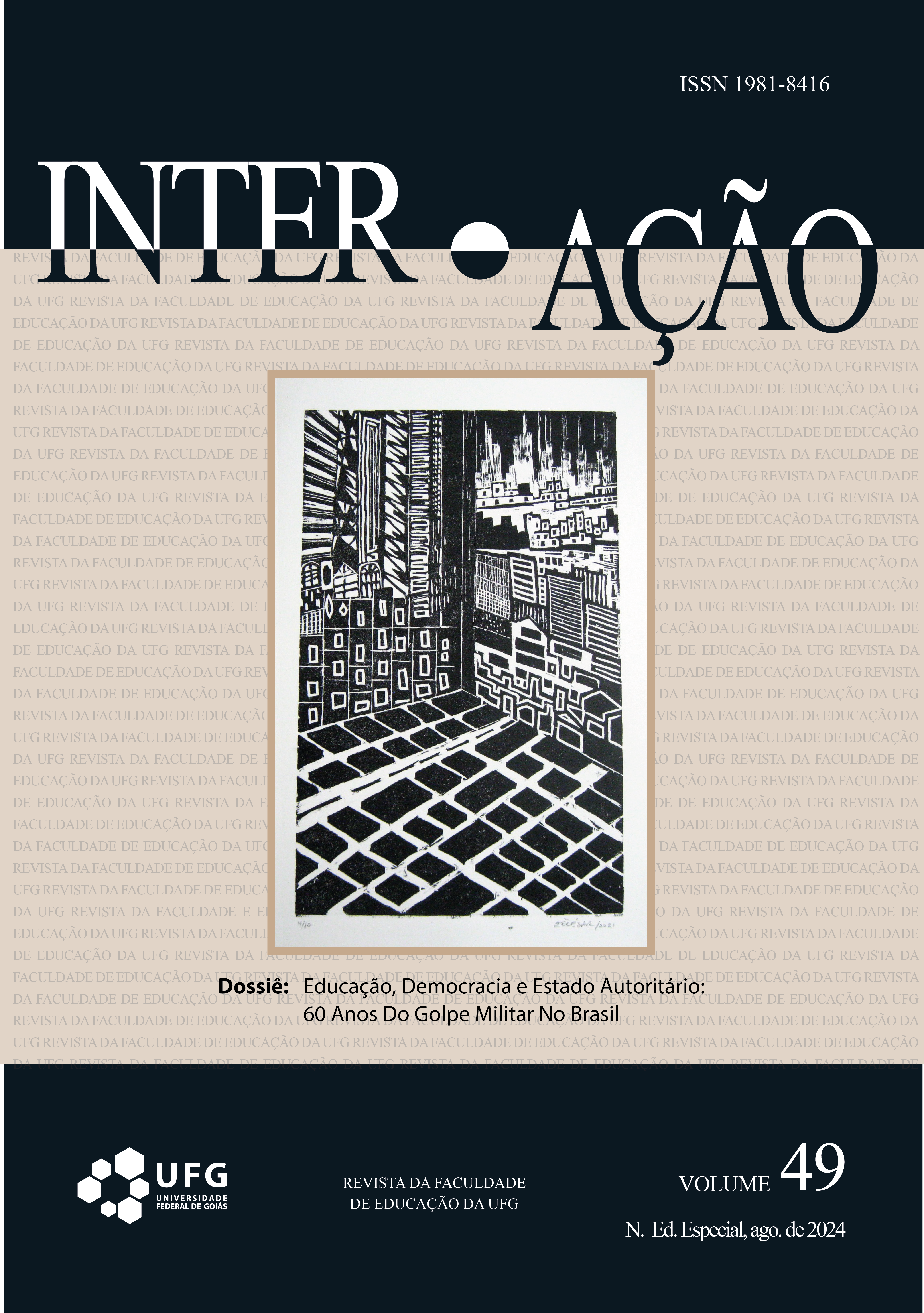THE 1964 COUP AND THE SUBJUGATION OF EDUCATION BY CAPITAL: THE CASE OF UNIVERSITY REFORM IN BRAZIL
DOI:
https://doi.org/10.5216/ia.v49ied.especial.78917Keywords:
Education; Business-Military Dictatorship; University Reform; Law N. 5.540/68.Abstract
The purpose of this work is to analyze the links between the 1964 business-military coup, the economic interests of the bourgeoisie associated with imperialism, and education constitutes the purpose of this work. To achieve the proposed objectives, the chosen research is of a bibliographic and documentary nature from the period, aiming to unveil the class character of the coup d'état. Thus, the concept of the state within Marxist thought is important for understanding the interests and presence of bourgeois hegemony in the University Reform (Law No. 5.540/68). Therefore, the modernization of higher education is considered one of the instruments for promoting economic development presented as a general interest of the nation.
Downloads
References
ATCON, R. P. Rumo a reformulação estrutural da universidade brasileira. Rio de Janeiro: Ministério da Educação e Cultura - Diretoria do Ensino Superior, 1966.
ARQUIDIOCESE DE SÃO PAULO. Brasil: Nunca Mais. Petrópolis: Vozes, 1985.
BRASIL. Lei n.º 4.131, de 3 de setembro de 1962. Disciplina a aplicação do capital estrangeiro e as remessas de valores para o exterior e dá outras providências. Disponível em: https://www2.camara.leg.br/legin/fed/lei/1960-1969/lei-4131-3-setembro-1962-353921-publicacaooriginal-1-pl.html. Acesso em: 25 mar. 2024.
BRASIL. Ato Institucional n.º 1, de 9 de abril de 1964. Dispõe sobre a manutenção da Constituição Federal de 1946 e as Constituições Estaduais e respectivas Emendas, com as modificações introduzidas pelo Poder Constituinte originário da revolução Vitoriosa. Disponível em: https://www.planalto.gov.br/ccivil_03/ait/ait-01-64.htm. Acesso em: 25 mar. 2024.
BRASIL. Constituição da República Federativa do Brasil de 1967. Disponível em: https://www.planalto.gov.br/ccivil_03/constituicao/constituicao67.htm. Acesso em: 25 mar. 2024.
BRASIL. Decreto n.º 62.937, de 2 de julho de 1968. Dispõe sobre a instituição de grupo de trabalho para promover a reforma universitária e dá outras providências. Disponível em: https://www2.camara.leg.br/legin/fed/decret/1960-1969/decreto-62937-2-julho-1968-404810-publicacaooriginal-1-pe.html. Acesso em: 25 mar. 2024.
BRASIL. Presidência da República. Reforma universitária: relatório do grupo de trabalho criado pelo decreto n.º 62937/68. Brasília: Presidência da República, 1968.
BRASIL. Ato Institucional n.º 5, de13 de dezembro de 1968. São mantidas a Constituição de 24 de janeiro de 1967 e as Constituições Estaduais; O Presidente da República poderá decretar a intervenção nos estados e municípios, sem as limitações previstas na Constituição, suspender os direitos políticos de quaisquer cidadãos pelo prazo de 10 anos e cassar mandatos eletivos federais, estaduais e municipais, e dá outras providências. Disponível em: https://www.planalto.gov.br/ccivil_03/ait/ait-05-68.htm. Acesso em: 25 mar. 2024.
BRASIL, Decreto-Lei n.º 477, de 26 de Fevereiro de 1969. Define infrações disciplinares praticadas por professores, alunos, funcionários ou empregados de estabelecimentos de ensino público ou particulares, e dá outras providências. Disponível em: https://www2.camara.leg.br/legin/fed/declei/1960-1969/decreto-lei-477-26-fevereiro-1969-367006-publicacaooriginal-1-pe.html. Acesso em: 25 mar. 2024.
RELATÓRIO MEIRA MATTOS mostra a situação do ensino universitário. Correio da Manhã, 25 de agosto de 1968, p. 3
CUNHA, L A. A universidade reformada. Rio de Janeiro: Francisco Alves, 1988.
CURY, C. R. J. Educação e Contradição: elementos metodológicos para uma teoria crítica do fenômeno educativo. São Paulo: Cortez, 1989.
DREIFUSS, R. A. 1964: a conquista do Estado. Ação política, poder e golpe de classe. Petrópolis: Vozes, 1981.
IANNI, O. O colapso do populismo no Brasil. Rio de Janeiro: Editora Civilização Brasileira, 1988.
SILVA, G. C. Conjuntura Política Nacional: o Poder Executivo & Geopolítica do Brasil. Brasília. Editora Universidade de Brasília; Rio de Janeiro: Livraria José Olympio Editora, 1981.
SCHULTZ, T. W. O capital humano: investimentos em educação e pesquisa. Rio de Janeiro: Zahar Editores, 1973.
SOUZA, J. G. Evolução histórica da universidade brasileira: abordagens preliminares. Revista da Faculdade de Educação PUC-Campinas, Capinas, v. 1., n. 1, 1996. Disponível em: https://periodicos.puc-campinas.edu.br/reveducacao/article/view/461/441. Acesso em: 25 mar. 2024.
ZANELATO, I. A. A Educação na Mira da Ditadura: a quem interessou as reformas educacionais do Ensino Superior e de 1º e 2º grau? São Paulo: Dialética, 2024.
Published
How to Cite
Issue
Section
License
Copyright (c) 2024 Marco Antônio de Oliveira Gomes, Italo Ariel Zanelato, Alessandro Santos da Rocha, Maria Cristina Gomes Machado

This work is licensed under a Creative Commons Attribution-NonCommercial 4.0 International License.
Inter-Ação uses the Creative Commons Attribution 4.0 License for Open Access Journals (Open Archives Initiative - OAI) as the basis for the transfer of rights. Open access means making documents available on the Internet free of charge, so that users can read, download, copy, distribute, print, search, or link to the full text of documents, process them for indexing, use them as input data for software programs, or use them for any other lawful purpose, without financial, legal, or technical barriers.
Authors publishing in this journal agree to the following conditions:
1) Authors retain copyright and grant the journal the right of first publication, with the work simultaneously licensed under the Creative Commons Attribution License, which permits redistribution of the work with attribution and first publication in this journal.
2) Authors are permitted to enter into additional, separate agreements for non-exclusive distribution of the version of the work published in this journal (e.g., for publication in an institutional repository or as a book chapter), with attribution and first publication in this journal.
3) Authors are permitted and encouraged to publish and distribute their work online (e.g. in institutional repositories or on their home page) at any time before or during the editorial process, as this may generate productive changes as well as increase the impact and citation of the published work.















